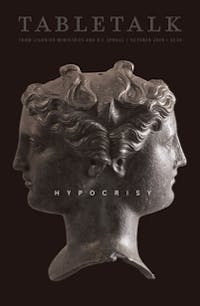
Request your free, three-month trial to Tabletalk magazine. You’ll receive the print issue monthly and gain immediate digital access to decades of archives. This trial is risk-free. No credit card required.
Try Tabletalk NowAlready receive Tabletalk magazine every month?
Verify your email address to gain unlimited access.
I just began reading a book by a well-known pastor who, in the opening pages, referred to himself as a “professional hypocrite.” Being a pastor, he is all too familiar with the hypocrite label that is so often leveled at pastors. On the surface it certainly seems appropriate for all pastors, and for that matter all Christians to admit that we are hypocrites. However, if we really understand what it means to be a hypocrite, then we should do everything necessary to avoid being labeled as such. We must be careful not to become hypocritical in acting as if being called a hypocrite doesn’t matter. Furthermore, we must not think for a minute that just because you announce you are a hypocrite that you are not a hypocrite. While we must always strive to be genuine and honest people of God in all that we do, admitting our faults and confessing our sins to the church and the world, we also must always strive to be people who are known by the church and the world to be striving after true holiness.
In the nineteenth century, the English pastor J.C. Ryle wrote, “Whatever we are in our religion, let us resolve never to wear a cloak. Let us by all means be honest and real.” Being “real” is not a twenty-first century invention of the twenty-something crowd. It is a most Christian virtue exemplified by Jesus Himself—a most holy virtue of those who seek daily to live an authentic life before the face of God, in the church and before the watching world.
Although the superficial facade of Christian religiosity should make us sick, bringing us to tears and godly sorrow, it should also make us detest our hypocritical approach to hypocrisy, which Christ Himself detested. For He not only practiced what He preached, but He preached what He practiced—a life of genuine holiness before God and men. This is our calling as well, whether pastor or parishioner, relying on the grace of God and trusting Christ our holiness, knowing that the genuineness of our faith will be proven, resulting in praise and glory and honor at the revelation of Jesus Christ (1 Peter 1:7).
